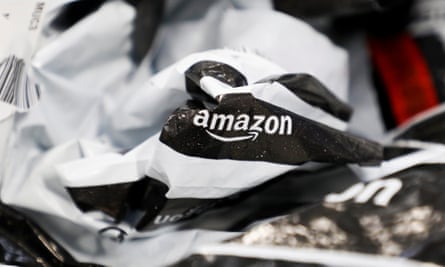Amazon is under pressure to reduce its plastic footprint, as shareholders prepare to vote on Wednesday on a resolution calling for it to disclose how much of its plastic packaging ends up in the environment.
The resolution, co-proposed by the activist shareholder group As You Sow, calls on the world’s largest online retailer to provide a report by December 2021 showing how much plastic packaging is attributable to its activities, and what actions it has taken to tackle the issue. Amazon’s board of directors have recommended that shareholders vote against the proposal.

Last year a report by Oceana, a conservation group, estimated that Amazon had generated 210,000 tonnes (465m lbs) of plastic packaging waste in 2019, including enough air pillows to circle the Earth 500 times, and that up to 10,000 tonnes of plastic entered freshwater and marine ecosystems that year.
Amazon has disputed Oceana’s figures, accusing the group of “dramatically miscalculating” its use of plastic, saying it had used “about a quarter” of the figure quoted. The company claimed to have reduced the weight of outbound packaging by more a third and eliminated more than 1m tonnes of packaging material since 2015.
The new resolution cites growing concern about the amount of plastic ending up in oceans, where it harms marine life. It notes that Unilever aims to cut plastic packaging use by 100,000 tonnes by 2025, and that PepsiCo has committed to substituting recycled content for 35% of virgin plastic in its beverage division.
Earlier this month, As You Sow’s campaign got a boost when a proxy advisory firm, Institutional Shareholder Services (ISS), recommended that Amazon shareholders vote in favour of the proposal. It cited rising concern over the environmental damage caused by plastics, as well as regulations expected in the future.
Conrad MacKerron, senior vice-president of As You Sow, said: “The ISS recommendation is huge and very influential. A lot of investors rely on these recommendations because they don’t have time to read all of the arguments and all of the proxies. We will have a very healthy vote on Wednesday.”
Amazon’s board is expected to get its way in the matter, but MacKerron said he was hoping for up to 30% of the vote.
The chemical multinational Du Pont recently lost a shareholder vote calling for more transparency over plastic pollution, when a record 81% of investors voted in favour.
“It was unprecedented,” said MacKerron, who has filed 10 proposals this year to corporate shareholders to reduce plastic and reached agreement on five of them, including with Walmart, the largest US grocery retailer. “It shows the changes afoot by the big investors.”
Amazon is “critically important” because of its dominance in the e-commerce market, he said.
In its recommendation to shareholders, ISS notes Amazon’s various initiatives to design packaging that uses less plastic or is more recyclable. But it said: “While the company discusses the impact in terms of plastic waste reduction, it does not provide an overall baseline amount of plastic used throughout its supply chain.”
In response to the resolution, Amazon said it would review and address the “concern for reducing plastic pollution” by taking steps to share information on its progress on the issue.
It said it had made progress to reduce plastic use in four key areas: plastics in packaging for products manufactured by other companies; plastics in packaging that Amazon repackages for delivery; plastics in Amazon’s own devices and labelled products; and plastics in physical stores, such as Whole Foods.
“In addition, we are focused on our goal of having the packaging for Amazon devices be plastic-free and made up of entirely kerbside recyclable material by 2023,” Amazon said.
